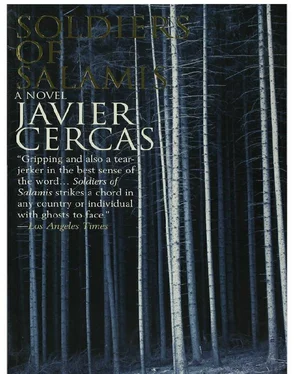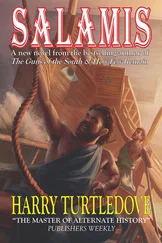I ate lunch in the Café Central, in Place Grangier, very near to where I'd had breakfast that morning and, after drinking a coffee and a whisky at a Café on rue de la Poste and buying a carton of cigarettes, returned to the Résidence des Nimphéas. It wasn't yet five when Miralles invited me up to his room and I noticed, not without surprise, that it wasn't the sordid institutional room I'd expected, but a neat, orderly and bright little apartment: one glance showed me a kitchen, a washroom, a bedroom and a little lounge with almost bare walls, two big armchairs, a table and big window onto a balcony open to the afternoon sun. I handed Miralles the carton of cigarettes in greeting.
'Don't be an idiot,' he said, tearing off the cellophane wrapper and taking out two packets. 'Where do you expect me to hide this?' He gave me back the rest of the carton. apos;Would you like a nescafé? Decaffeinated, of course. They've forbidden me the real stuff.'
I didn't feel like one, but I accepted. As he made the coffee, Miralles asked me how I liked the apartment; I told him I liked it very much. He told me about the services (medical, recreational, cultural, cleaning) the home offered, and the rehabilitation exercises he had to do daily. When he'd finished making the coffee, I picked up the cups to take them into the lounge, but he motioned to me to stop; opening a low cupboard, he leaned half-way in with the agility of a contortionist and triumphantly brought out a hipflask.
'If you don't add a bit of this,' he remarked while pouring a shot in each cup, 'this stuff tastes like shit.'
Miralles put the flask back in its place,| and then, each with our cup, we sat in the armchairs in the little lounge. I took a sip of nescafe; what Miralles had added was cognac.
'Now then,' said Miralles, amused, almost flattered, sitting back in his chair and stirring his nescafe. 'Shall we carry on with the interrogation? I assure you I've told you everything I know.'
I suddenly felt ashamed to keep asking him things, and felt like telling him that, even if I didn't have any questions to ask him, I'd be there anyway, chatting and drinking nescafe with him; for a moment I thought that I already knew everything I needed to know from Miralles, and, I don't know why, I remembered Bolaiño and the night when he'd come across Miralles dancing a paso doble with Luz under the awning of his caravan and understood that his time at the campsite was up. In a flash I thought of Bolaño and my book, of Soldiers of Salamis, of Conchi and of the many months I'd spent searching for the man who'd saved Sánchez Mazas' life and for the meaning of a look and a shout in the woods, searching for a man who'd danced a paso doble in the garden of an improvised prison, sixty years earlier, just as Miralles and Luz had danced to another paso doble (or maybe the same one) in a working-class campsite in Castelldefells, under the awning of his improvised home. I didn't ask him anything, and said, as if it were a revelation:
'Sánchez Mazas survived the firing squad.' Miralles nodded, patiently, enjoying his nescafe with cognac. 'He survived thanks to a particular man, I added. One of Líster's soldiers.'
I told him the story. When I'd finished, Miralles set his empty cup on the table and, leaning over a bit, and without getting out of the chair, he opened the balcony window and looked outside.
'Sounds like fiction, that story,' he said, in a neutral tone of voice, as he took a cigarette out of the half-empty pack from the morning.
I remembered Miquel Aguirre and said:
'Possibly. But all wars are full of stories that sound like fiction, aren't they?'
'Only for those who don't live through them.' He exhaled a plume of smoke and spat something out, perhaps a shred of tobacco. 'Only for those who tell them. For those who go to war to tell it, not to fight it. What was the name of that American novelist who entered Paris. .?'
'Hemingway.'
'Hemingway, that's it. What a clown!'
Miralles went quiet, distracted, as he watched the columns of smoke waving slowly in the still light on the balcony, through which the intermittent traffic noise reached us.
'And this story about Líster's soldier,' he started, turning back to me: the right half of his face had again taken on its stone-like appearance; on the left was an ambiguous expression of indifference and disappointment, almost annoyance. apos;Who told you that?'
I explained. Miralles nodded, his mouth a circumflex, almost mocking. It was obvious the jovial spirit he'd welcomed me with that afternoon had disappeared. I didn't know what to say, but I knew I had to say something; but Miralles got in there first:
'Tell me something. You don't really care about Sánchez Mazas and his famous firing squad, right?'
'I don't know what you mean,' I said, quite honestly.
He looked into my eyes with curiosity.
'Got to hand it to you fucking writers!' he laughed. 'So what you were looking for was a hero. And I'm that hero, is that it? Can you believe it! But hadn't we decided you were a pacifist? Well, you know something? There aren't any heroes in peacetime, except maybe that little Indian guy who always went around half naked. . And he wasn't even a hero, or only once they'd killed him. Heroes are only heroes when they die or get killed. The real heroes are born out of war and die in war. There are no living heroes, young man. They're all dead. Dead, dead, dead.' His voice cracked; after a pause, as he swallowed hard, he stubbed out his cigarette. 'Do you want another of these concoctions?'
He went to the kitchen with the empty cups. From the little lounge I heard him blow his nose; when he came back his eyes were shining, but he seemed to have calmed down. I suppose I must have tried to apologize for something, because I remember that, after handing me the nescafé and leaning back again in his armchair, Miralles interrupted me impatiently, almost irritated.
'Don't apologize, young man. You haven't done anything wrong. Besides, at your age you should know by now that a man doesn't apologize: he does what he does and says what he says, and then puts up with it. I'm going to tell you something you don't know, something about the war.' He took a sip of nescafé; so did I (Miralles had gone overboard with the cognac). 'When I left for the front in '36, these other boys went with me. They were from Terrassa, like me; very young almost children — just like me; I knew some of them to see them or to speak to, but most of them I didn't. There were the García Segués brothers (Joan and Lela), Miquel Cardos, Cagi Baldrich, Pipo Canal, el Gordo Odena, Santi Brugada and Jordi Gudayol. We fought the war together, both wars, ours and the other one, though they were both the same one. None of them survived. They all died. The last one was Lela Garcia Segues. At first I got along better with his brother Joan, who was the same age as me, but in time Lela became my best friend, the best I've ever had: we were such good friends we didn't even have to talk when we were together. He died in the summer of '43, in a town near Tripoli, crushed by an English tank. You know what? Since the war ended, not a single day has gone by when I haven't thought about them. They were so young. . They all died. All of them dead. Dead. Dead. All of them. None of them tasted the good things in life: none of them ever had a woman all to himself, none of them knew the wonder of having a child and of their child, at three or four years of age, climbing into his bed between him and his wife, on a Sunday morning, in a room full of sunshine. .' At some point Miralles had started to cry: his face and his voice hadn't changed, but inconsolable tears streamed down the smooth channel of his scar, rolling more slowly down his unshaven cheeks. 'Sometimes I dream of them and then I feel guilty. I see them all: intact and greeting me with jokes, just as young as they were then, because time doesn't pass for them, they're just as young, and they ask me why I'm not with them — as if I'd betrayed them, because my true place was there; or as if I were taking the place of one of them; or as if in reality I had died sixty years ago in some ditch in Spain or Africa or France and I were dreaming a future life with a wife and children, a life that would end here, in this room in a home, chatting away to you.' Miralles kept talking, more quickly, without drying the tears that ran down his neck and soaked into his flannel shirt. 'Nobody remembers them, you know? Nobody. Nobody even remembers why they died, why they didn't have a wife and children and a sunny room; nobody remembers, least of all, those they fought for. There's no lousy street in any lousy town in any fucking country named after any of them, nor will there ever be. Understand? You understand, don't you? Oh, but I remember, I do remember, I remember them all, Lela and Joan and Gabi and Odena and Pipo and Brugada and Gudayol, I don't know why I do but I do, not a single day goes by that I don't think of them.'
Читать дальше












